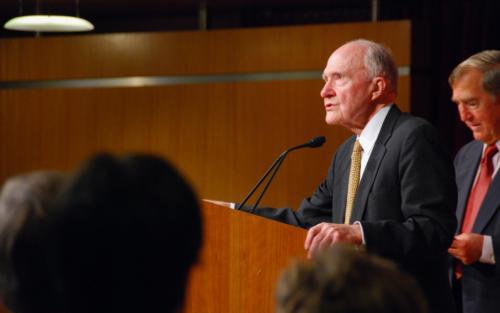
News
Progressive Labor Party Organizes Solidarity March With Harvard Yard Encampment

News
Encampment Protesters Briefly Raise 3 Palestinian Flags Over Harvard Yard

News
Mayor Wu Cancels Harvard Event After Affinity Groups Withdraw Over Emerson Encampment Police Response

News
Harvard Yard To Remain Indefinitely Closed Amid Encampment

News
HUPD Chief Says Harvard Yard Encampment is Peaceful, Defends Students’ Right to Protest
Scowcroft Speaks On U.S. Image

Brent Scowcroft, former national security advisor under Presidents George H.W. Bush and Gerald R. Ford, said last night that the greatest challenge facing the next president is the poor image of America abroad.
“The world is in need of serious leadership,” Scowcroft said at the Institute of Politics. “I mean real leadership—the convening power, the ability to get nations around common purposes and move together. We had that in the past...We don’t have that anymore.”
Scowcroft said that the future occupant of the Oval Office will need to reexamine the structure of America’s foreign policy advising system.
“The next president—whoever he may be—needs to have the best thinking around him,” Scowcroft, who has not endorsed either Barack Obama or John McCain, said. “There are problems that come from areas of the world we don’t understand at all.”
“Many of the conflicts that we are facing now and in the future will not be the great wars with great countries...but the messy things. Partly fighting, partly nation-building,” he said.
Scowcroft’s talk offered a broad survey of the current foreign policy landscape and its existing issues—the political situation in middle eastern countries; the rise of China and its global influence; and the evolving Russo-U.S. relationship.
Pointing to the Middle East as an example, Scowcroft said that international problems no longer end within country lines but are instead “overlapping and interconnected.”
“The progress in Iraq is fragile and easily reversed. And it will be a shame, after going so far, to just turn around and let it collapse, because a collapse in Iraq is not just a collapse in Iraq. It could lead to a Middle East that looks like Iraq now,” Scowcroft said.
But Scowcroft also challenged the reasons for America’s initial involvement in the region.
“This administration, I think, was traumatized by 9/11...they were swept away by the notion that we could solve the problem in this difficult region by moving in and taking out Saddam [Hussein] and creating a democracy that could spread to the rest of the region,” he said.
One student asked the former national security advisor how experienced members of the current Bush administration made serious foreign policy errors.
“Experience is valuable, but experience is only valuable if you have the judgement to know when to apply it and when not to apply it,” Scowcroft said.
Many students attending were impressed by Scowcroft’s candid treatment of these challenging issues.
“The talk was an astounding acknowledgement of the political instability in the world, combined with a determined resolution to solve the problems,” said Vibha K. Kagzi, a first-year student at the Harvard Business School.
Want to keep up with breaking news? Subscribe to our email newsletter.
